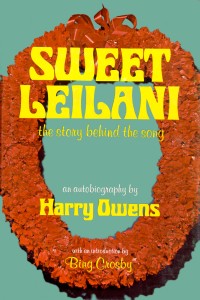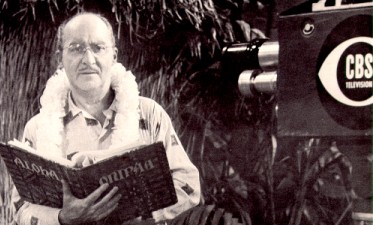Harry Owens credits Hawaii with his rebirth in 1934 when he first sailed past Diamond Head on Matson's
S. S. Mariposa. Born in O'Neill, Nebraska on April 18, 1902, Owens came to the islands to lead the
orchestra at the Royal Hawaiian Hotel in 1934. He met several knowledgeable native Hawaiians and learned a great
deal about their culture, embraced it as his own, and transcribed many ancient and 20th century Hawaiian
songs which had never been written down before, much less orchestrated.
George Kanahele, in Hawaiian Music and Musicians, says, "He reorganized the Royal Hawaiians by splitting
the band into Hawaiian and haole instrumental sections. He also made the steel guitar--with its opening
glissando--an integral part of the new sound...which was sweet, rhythmic, and danceable, and Hawaiian-ish."
Through the years, Owens became
one of the grand cheerleaders for Hawai'i as he took his band and troupe (usually including Hilo Hattie) all over
the mainland.
"All Hawaiian, all the time" was his philosophy and he followed it at regular engagements at Los
Angeles's Ambassador Hotel Coconut Grove nightclub, the Mural Room at the St. Francis in San Francisco and
on television with a regular hour-long program all through the 1950s.
He wrote his biggest hit and signature song, "Sweet Leilani" upon the birth of his first child and, when used in
the Paramount film Coconut Grove, the
song won an Academy Award and topped the hit parade for 28 weeks. His friend
Bing Crosby made the song a worldwide hit.
Over the years, Owens composed many hapa haole songs, many of which remain popular today. He is credited
with composing some 300 songs and made over 150 records for Decca alone.
He is credited with reinforcing the hapa haole style of Hawaii music developed by Sonny Cunha and Johnny Noble
and bringing it into the mainstream. In 1940, the Honolulu Star-Bulletin said, "He gave to orchestral renditions
a new sweetness of melody, a new appealing rhythm, an enchanting soft charm, which did far more than pack
dance floors with dipsy-doodle devotees."

Autobiography: Sweet Leilani: The Story Behind the Song, (1970), Hula House, Pacific Palisades, CA.


